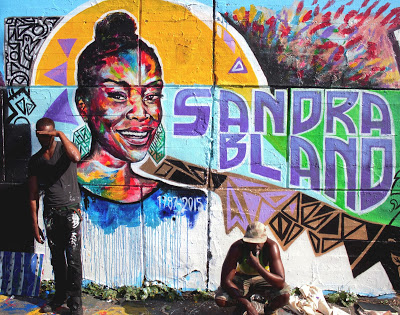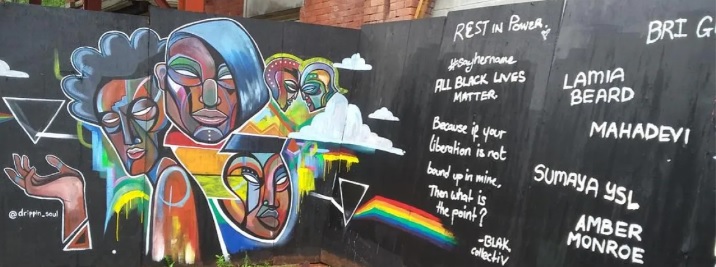Kalkidan Assefa is a Ottawa-based artist who works in the multidisciplinary realm, specializing in murals. He has accomplished mural projects in some cities and institutions, like the City of Ottawa, City of Toronto, Vanier BIA, Byward Market BIA, and Ottawa Art Gallery. He is also a certified Artist-Educator that has facilitated interactive workshops for a diverse range of communities.
His works aim to be empowering, celebrating, and uplifting people through visual representation. Blackness is the central subject of his works. He was struck by the overwhelming absence of black faces either on or behind the canvas. Therefore, presenting and centering Blackness is always provocative.

http://www.kalkidan-assefa.com/2015/07/thoughts-on-ottawa-techwall-sandra.html
Two of Assefa’s murals that give representation to marginalized communities were defaced and destroyed in 2015. These two destructions were motivated by anti-black sentiment and transphobic sentiment.
Once time, Assefa and Allan Andre painted a mural tribute to Sandra Bland. Their work called public attention both support and against them. Overnight, the mural was defaced with the tagline ‘All Lives Matters’. Black communities have often explained that Black Lives Matter does not negate the importance of any other life, but the attacks on them continuously happened.

A mural honouring murdered transgender women of colour near the corner of Bank and Somerset streets (before it was defaced) (@AnaAlejandrinaM/Twitter) https://www.cbc.ca/
Kalkidan Assefa writes:
“On a personal level, the centering of blackness in my work means that I am by default excluded from certain circles of repute in the art world, especially if the work is not presented within the confines of the European and Western traditions of fine art”.
Assefa thinks that art needs to be decolonized and it “has already begun in a growing number of communities where people of color have challenged the European (and Western) values driving the corporate globalization of art”.
Another important thing is that he has realized “when you create art in the community and for the community, the community takes ownership of it…Most importantly, they went out and created more art of their own”.
Kalkidan Assefa’s full story can be read on: “Artist’s statement: What decolonization of art means to me” (Decolonization: Indigeneity, Education & SocietyVol. 4, No. 2, 2015)
